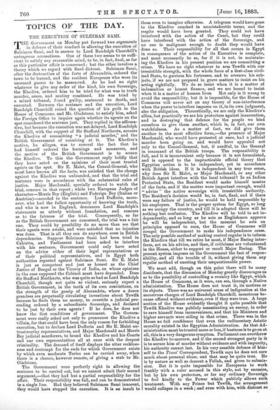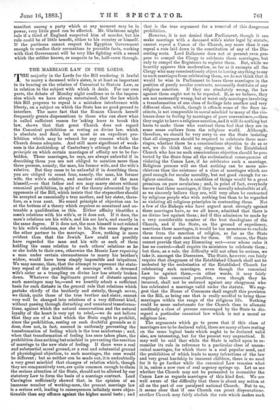TOPICS OF THE DAY.
THE EXECUTION OF SULEIMAN SAMI.
THE Government on Monday put forward two arguments in defence of their conduct in allowing the execution of Suleiman Sami, and in answer to Lord Randolph Churchill's outrageous accusations. One of these two seems to us suffi- cient to satisfy any reasonable mind, to be, in fact, final, as far as this particular affair is concerned ; but the other involves a theory which we regard with fixed distrust. Suleiman Sami, after the destruction of the forts of Alexandria, ordered the town to be burned, and the resident Europeans who were its unarmed guests to be massacred. As he had no right whatever to give any order of the kind, his own Sovereign, the Khedive, ordered him to be tried for what was in truth murder, arson, and mutiny combined. He was tried by a mixed tribunal, found guilty, sentenced to death, and executed. Between the sentence and the execution, Lord Randolph Churchill raised the question of his guilt in the House of Commons, and Mr. Gladstone, to satisfy him, asked the Foreign Office to inquire again whether its agents on the spot considered the sentence just. They replied in the affirma- tive, but because the execution was not delayed, Lord Randolph Churchill, with the support of Sir Stafford Northcote, accuses the Khedive of committing " a judicial murder," and the British Government of conniving at it. The Khedive's motive, he alleges, was to conceal the fact that he had himself ordered the burnings and massacres, and the motive of the British Government is to screen the Khedive. To this the Government reply boldly that they have acted on the opinions of their most trusted agents on the spot. Sir E. Malet, the Consul-General, who must have known all the facts, was satisfied that the charge against the Khedive was unfounded, and that the trial and sentence were in accordance with the substantial rules of justice. Major Macdonald, specially ordered to watch the trial, concurs in that report ; while two European Judges of character—Morris Bey (English) and Federigo Bey (Italian or Austrian)—acceded to the sentence. Lord Dufferin, more- over, who had the fullest opportunity of knowing the truth, and who is now in England, denounces Lord Randolph's statements as utterly without foundation, and concurs as to the fairness of the trial. Consequently, so far as the British Government are concerned, the trial was a fair one. They could by possibility do no more than see that their agents were awake, and were satisfied that no injustice was done. That is all they can do anywhere, even in British dependencies. Suppose Suleiman Sami had been tried in Calcutta, and Parliament had been asked to interfere with his sentence, Government could only have acted on the advice either of their legal representatives or of their political representatives, and in Egypt both authorities reported against Suleiman Sami. Sir E. Malet is just as competent and just as honest as the Chief Justice of Bengal or the Viceroy of India, on whose opinions in the case supposed the Cabinet must have depended. Does Sir Stafford Northcote, who was quite as bad as Lord Randolph Churchill, though not quite so violent, seriously expect a British Government, in the teeth of its own convictions, on the strength of the gossip of Alexandria, where a dozen grandees are perpetually circulating inventions about Tewfik because he finds them no money, to override a judicial pro- ceeding ordered by a subordinate Sovereign, and declared to be just by their own agents ? If he does, he does not know the first conditions of government. The Govern- ment were really asked not only to pronounce the Khedive a villain, for that could have been the only reason for forbidding execution, but to declare Lord Dufferin and Sir E. Malet un- trustworthy representatives, and Major Macdonald and Morris Bey judicial murderers, to brand the Khedive and his Courts and our own representatives all at once with the deepest criminality. The demand of itself displays the utter reckless- ness and contempt for the ends for which Government exists by which even moderate Tories can be carried away, when there is a chance, however remote, of giving a stab to Mr. Gladstone.
The Government were perfectly right in allowing the sentence to be carried out, but we cannot admit their second argument,—that they had but a partial responsibility for the affair. Their responsibility was full, and can be demonstrated in a single line. Had they believed Suleiman Sami innocent, they would have stopped the execution. It is an insult to
them even to imagine otherwise. A telegram would have gone. to the Khedive couched in unmistakeable terms, and the- respite would have been granted. They could not have interfered with the action of the Court, but they could. have interfered with the action of the Sovereign, and. no one is malignant enough to doubt they would have done so. Their responsibility for all that occurs in Egypt in consequence of the action of its Executive is complete, and must necessarily be so, for if it is not, in maintain- ing the Khedive in his present position we are committing a crime. We have no right whatever to arm Tewfik with our -irresistible strength, with the whole force of a first-class civil- ised State, to garrison his fortresses, and to overawe his sub- jects, if we are not prepared in grave matters to insist on his acting rightfully. We do so insist when it is a matter of indemnities or honest finance, and we are bound to insist. when it is a matter of human lives. Not only is it wrong to- avoid the responsibility, but it is impossible, for the House of Commons will never act on any theory of non-interference when the power to interfere imposes on it, in its own judgment,. also the obligation. Theoretically, we are only the Khedive's, allies, but practically we are his protectors against insurrection, and in destroying that defence for the people we bind ourselves to give them another, which is, in fact, our own. watchfulness. As a matter of fact, we did give them. another in the most effective form —the presence of Major Macdonald, who would have protested at once, had a judicial murder been going on, and would have appealed not only to the Consul-General, but, if needful, to the General in command of the British troops. The responsibility is full, and it is inconvenient only because it is not formulated, and is opposed to the impracticable official theory that Egyptian action is to be independent, yet in accordance with British ideas. If it is independent in any true sense,. why does Sir E. Malet, or Major Macdonald, or any other British Agent interfere with the local tribunal / In an Indian. Protected State, the Resident would make himself master of the facts, and if the matter were important enough, would_ " advise " the native sovereign with irresistible authority. The Resident's decision would be, in fact, final, and if there were any failure of justice, he would be held responsible by his employers. That is the proper system for Egypt, so long as we occupy the country, and till it is adopted there will be nothing but confusion. The Khedive will be told to act in- dependently, and so long as he acts as Englishmen approve he will be independent, but the moment he acts on principles opposed to ours, the House of Commons will compel the Government to make his independence cease. The only possible method of making control regular is to inform. the Khedive that till we retire he must, if Major Baring inter- feres, act on his advice, and then, if criticisms are volunteered in the House, either to support or recall Major Baring. The present system imposes on the Government the fact of respon- sibility, and all the trouble of it, without giving them any regular method of exerting their unquestionable power.
We must add, though on this point there will be many dissidents, that the discussion of Monday greatly discourages us as to the possibility of controlling a country like Egypt, which the House of Commons, as it were, can see, through a Native administration. The House does not trust it, its motives or its objects. There was no universal sense of indignation at the monstrous charges of Lord Randolph Churchill, monstrous be- cause offered without evidence, even if they were true. A large section of the House evidently thought it quite possible that Tewfik Khedive was publicly assassinating an enemy, in order to save himself from inconvenience, and that his Ministers and higher servants were aiding in that crime. There was in the House no full confidence that even the rudimentary Asiatic morality existed in the Egyptian Administration. As that Ad- ministration must be trusted more or less, if business is to go on at all, this is a very dangerous symptom. Parliament can overthrow the Khedive to-morrow, and if the second strongest party in it is to accuse him of murder without evidence and with impunity, his authority cannot last. In his very sensible defence of him- self to the Times' Correspondent, Tewfik says he does not care much about personal abuse, and that may be quite true. He is by nature as well as descent a Fellah, and given to submis- sion. But it is quite impossible for Europeans to work frankly with a ruler accused in this style, not by enemies, but by his own protectors, or for any ordinary Sovereign to feel kindly to the Power which publicly allows such treatment. With any Prince but Tewfik, the arrangement would collapse in a week ; and even with him, with distrust so
manifest among a party which at any moment may be in power, very little good can be effected. Mr. Gladstone might rule if a third of England suspected him of murder, but his rule could be of little benefit, either to his country or himself. If the partisans cannot respect the Egyptian Government enough to confine their accusations to provable facts, working with that Government will be very like fighting with a sword which the soldier knows, or suspects to be, half-sawn through.



































 Previous page
Previous page